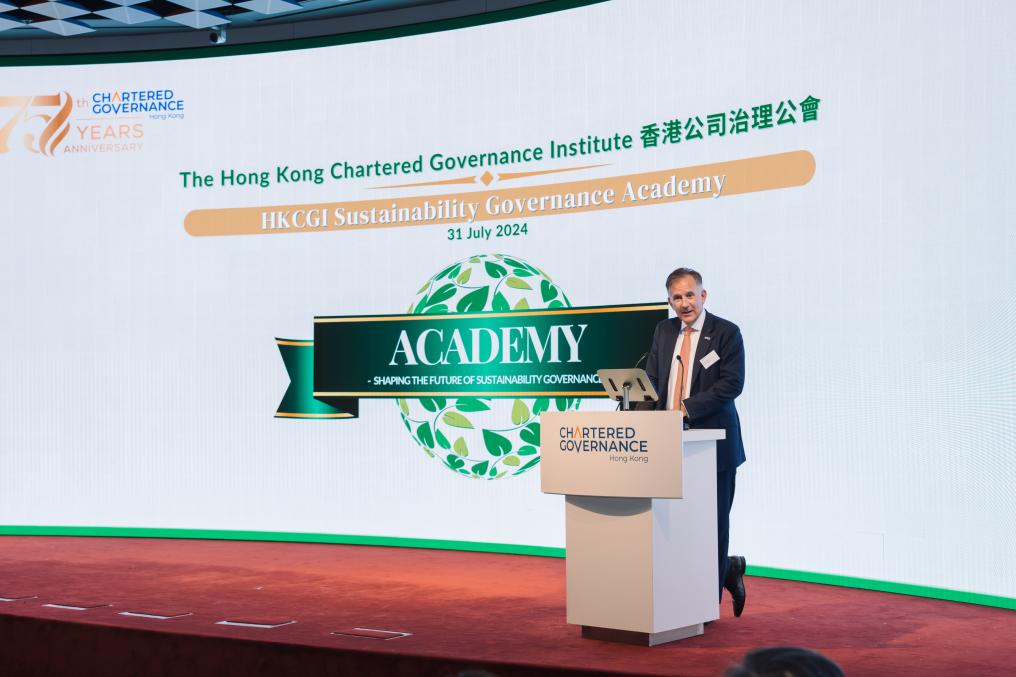CGj reviews a thought leadership paper published by The Chartered Governance Institute (CGI) to assist governance professionals guide their companies’ approach to corporate social responsibility (CSR) amid evolving stakeholder expectations.
Highlights
- the pitfalls of getting one’s CSR approach wrong – and the benefits of getting it right – can be enormous, as exemplified by the three case studies selected for the paper
- stakeholders now expect companies to act responsibly on ESG issues, and to create value for both the organisation and its wider stakeholder community as part of their social licence to operate
- governance professionals can no longer rely on historical ideas and narratives that may have worked in the past – instead, they need to find new CSR pathways with the aim of bettering society at large
A paper published in February 2024 by CGI’s Thought Leadership Committee, titled ‘Navigating social responsibility: A study of evolving stakeholder expectations’, aims to support governance professionals in their role of helping companies navigate their approach to CSR against the backdrop of today’s growing demands from stakeholders, investors and society at large. ‘Organisations must now navigate the many risks and rewards that come with the broadening social terrain in order to realise value for all stakeholders,’ the paper explains.
The pitfalls of getting it wrong – and the benefits of getting it right – can be enormous. The paper draws on three very different case studies, all from global brand names, but each with a different set of circumstances, complexities and outcomes. These companies – Shell plc (Shell), The Walt Disney Company (Disney) and the Inter IKEA Group (IKEA) – each ‘stepped into the spheres that used to be a preserve of the state’, the paper observes, but with very different results. Each case epitomises the challenge of navigating CSR in this fastchanging social terrain, for which there is no defined road map.
The paper also suggests a number of valuable institutional solutions, and provides practical guidance to governance professionals to help their organisations contribute to a better society for us all.
Background to the report
Companies have responsibilities both to their shareholders and to the wider stakeholder community. Stakeholder expectations have grown over the last decade to include the concept that major corporations should not just pursue their profit motive but should also operate in a manner that benefits the common good. That might mean taking a public stand on important social issues, but this can be complicated and can create difficulties.
As Jill Parrat, International President of CGI, points out in her foreword to the paper: ‘We are not suggesting that companies should take a public position on a social issue. That is a matter for the organisation. But as experienced governance professionals we are in a position to evaluate the experiences of other organisations and hopefully to provide useful guidance to our members and all governance professionals.’
Evolving stakeholder expectations
CSR has evolved from being a philanthropic exercise to being a matter that is of strategic importance. Governments, communities, employees and other stakeholders now expect companies to act responsibly on ESG issues on a consistent basis, and to create value not just for the organisation but also for its wider stakeholder community as part of their social licence to operate.
The cost of meeting these evolving stakeholder expectations has increased with ‘geopolitical impacts, such as wars, global supply chain issues, net-zero commitments, corruption, and cultural and ideological shifts’, the paper explains.
The challenge for organisations today is finding a balance between shaping their attitudes towards emerging social concerns, such as environmental issues, inclusivity and diversity, and avoiding being perceived as overstepping their corporate boundaries.
The paper outlines three different CSR frameworks, namely legitimacy theory, stakeholder theory and institutional theory, which are utilised in the analysis of the three case studies chosen. It also examines environmental forces caused by global ideological shifts and evolving governance models – such as the shift from shareholder primacy to stakeholder capitalism – to further inform the case study analysis. As the paper specifies: ‘Governance professionals can no longer rely on historical ideas and narratives that may have worked in the past but which do not have the same relevance today; instead, they should endeavour to find new CSR pathways with the aim of bettering society at large.’
Case studies
For their assessment, CGI’s Thought Leadership Committee selected three very different organisations, each of which is a household name, the aim of which was to highlight the contradictions and the harmonious possibilities of CSR, and how governance is impacted by both.
The paper considers four factors that have affected the organisations’ strategic approaches, although not all are relevant to each organisation: ideological factors, social factors, political factors and governance factors, the last of which applies to all three case studies.
Shell
Dating back to 1907 and operating in more than 70 countries, Shell became embroiled in protracted tensions with increasingly vocal social, environmental and climate forces after it was discovered that oil leaks had remained undetected from 2004 to 2007, negatively impacting the ecological systems of three villages in Nigeria.
The resultant court case, filed by Milieudefensie (Friends of the Earth in the Netherlands), six other non-governmental organisations and a number of private individuals, was finally resolved at the Court of Appeal in The Hague in 2022, resulting in a settlement of €15 million to be paid by Shell to the communities of the affected villages and an instruction from the Court for Shell to install leak detection equipment on all its pipelines.
Shell has since made a number of significant changes in an effort to address the societal expectations of stakeholders. Shell, and its subsidiary in Nigeria at the time, had seriously underestimated the advent of ideological pressure since the 1990s on businesses to uphold human and environmental rights, as well as the power of communities. This illustrates that the legitimacy of CSR is time and place dependent, and that what worked in, say, the 1960s does not work today.
Disney
In March 2022, Disney, which was founded in 1923, came up against serious criticism from a number of its employees, including through walkouts and resignations, as well as from various human rights groups and individuals, when the company initially declined to take a stance against Florida’s passage of the Parental Rights in Education Act, which restricted the teaching of sexuality and gender identity in schools. This was seen as a failure to integrate diversity, equity and inclusion as one of its core values, despite claiming to do so. The backlash resulted in the then CEO reversing the decision, with Disney now opposing the bill and pausing their funding to all anti-LGBTQ+ politicians.
This then led to a protracted, complex legal battle of approximately two years with the Government of Florida. Since the publication of CGI’s paper, on 27 March 2024, the case was finally settled in court to mutual agreement. This case exemplifies the dangers of getting caught in the crossfire between polarised social groups.
IKEA
CGI’s Thought Leadership Committee selected IKEA an example of what works in CSR. Founded in 1943 by 17-year-old Ingvar Kamprad, who grew up on a farm called Elmtaryd near the village of Agunarryd (the four initials of which make up the company name), IKEA’s business model is based on sustainability and affordability, as well as ethical business practices. The paper asserts that ‘the company’s visionary stance on circularity and ambition to become a circular business by 2030, as well as to transform the world into circularity, make IKEA a pioneer’.
Despite a few setbacks in terms of some accusations of poor labour practices and human rights violations through age discrimination, and of tax avoidance in certain cases, IKEA consistently ranks highly for its reputation and CSR initiatives. As the paper points out: ‘In the case of IKEA, the lesson to be learnt is being deliberate about social purpose and to include a sustainability factor in business modelling and institutional organisation.’
Institutional solutions
‘Navigation of the ever-changing CSR terrain requires organised and creative thinking, both within organisations and within their networks. This means developing structures and systems to include thought leadership, policy design and collaboration,’ the paper recommends. Four institutional solutions are suggested as set out below.
1. Clarity on social purpose. This helps define why a company does what it does and how that helps create a better world, including for the stakeholders and investors. As the paper states: ‘In an increasingly polarised world, social purpose helps navigate polarised social issues, which is what Disney faced.’
2. Transformational leadership. Transformational executives lead fresh thinking, and inspire and encourage innovation. ‘Relevant experience of an organisation’s executive group in social and political issues will help navigate difficult terrains,’ the paper advises, and cites the approach taken by IKEA’s founding leader as being an example of one that still positively impacts the institutional organisation and structure.
3. Integrated strategic approach. ‘A fully integrated approach to stakeholder inclusivity helps in mitigating financial loss, reputational damage, recruitment and retention problems, and political retaliation for organisations,’ the paper asserts. Organisations need to be aware of the social and environmental issues impacting them, accept the complexity of those issues and adapt by addressing the issues using creative and innovative approaches.
4. Communication and reporting. It is vital in today’s digital era that governance professionals help establish transparent and inspirational stakeholder communication channels and strategies for their organisations, while reporting and disclosure helps build harmony and trust with stakeholders.
Practical guidance for governance professionals
The paper sets out five recommendations for governance professionals to help their organisations deal with the evolving stakeholder expectations and lists a number of practical steps that represent good practice, which can be adapted for each organisation, some of which may require external input.
1. Full integration of CSR
Integrating CSR issues into strategies facilitates the decision-making process. Organisations need to identify which social issues are most relevant to them, clearly articulating why these issues have been selected and exactly how they will go about developing them.
2. Mandatory professional development for executives
Emerging social and political factors in an organisation’s ecosystem should first be identified, and any capacity gaps within the executive team need to be evaluated and addressed. Training should be made available for the C-suite and executive teams, and peer communication standards need to be developed and implemented.
3. Collaboration with stakeholders
Working in partnership with CSR networks in the organisation’s jurisdiction, as well as building collaborative initiatives in an organisation’s chosen area of CSR, enhances effectiveness.
4. Communication
The organisation’s purpose, strategy for political engagements and influence, and any collaborative initiatives, should be clearly and coherently communicated, with regular updates of the strategy.
5. Reporting
A company’s CSR initiatives and activities, along with its progress towards social purpose, should be disclosed on a regular basis, while research and insight papers on CSR to identify opportunities for better performance should be created.
Conclusion
The paper highlights that CSR concerns will continue to grow in line with evolving stakeholder expectations and the increasing demands of society. Effective CSR is a vital tool for creating a better world and its benefits go beyond the economic or financial. ‘Notwithstanding the inherent contradictions, tensions and risks within the CSR space, clarity in social purpose, transformative leadership, an integrated strategic approach and communication can help professionals and corporations to pilot CSR activities,’ the paper concludes.
The paper reviewed in this article is available on The Chartered Governance Institute website: www.cgiglobal.org.



